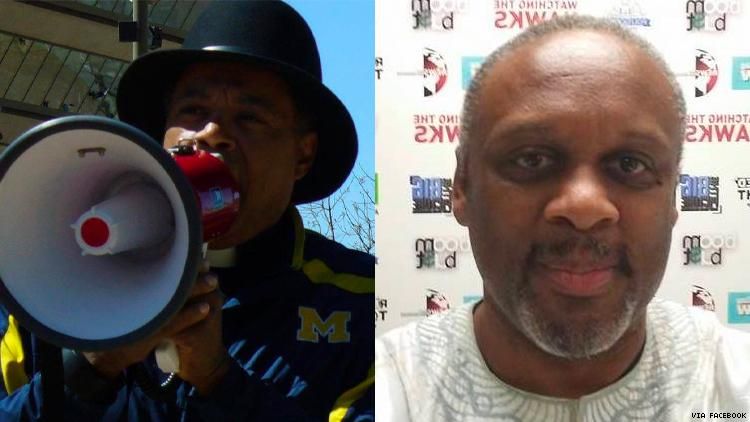Barry Manilow: Coming Out Sooner ‘Would Have Killed My Career’

The gay singer revealed why he spent decades in a glass closet.
www.advocate.com/music/2019/5/15/barry-manilow-coming-out-sooner-would-have-killed-my-career
Barry Manilow: Coming Out Sooner ‘Would Have Killed My Career’

The gay singer revealed why he spent decades in a glass closet.
www.advocate.com/music/2019/5/15/barry-manilow-coming-out-sooner-would-have-killed-my-career
How Shawn Mendes’ underwear ended up in John Mayer’s hotel room
Oh?
Pat Robertson Goes Full Tilt Fire-And-Brimstone Over the LGBTQ Equality Act: God Will ‘Vomit You Out’ — WATCH
Televangelist Pat Robertson had some words about the Equality Act after he was reminded what it was called (“they always give the good names to these things”) and it was full-on fire and brimstone. The House is expected to vote on the Equality Act on Friday.
Said Robertson: “This is a devastating blow to religious freedom and to the sanctity of America. If you want to bring the judgment of God on this nation, you just keep this stuff up. You know, I was reading in Leviticus where it said, ‘Because of these things, the land will vomit you out.’ Vomit you out. I think God will say, ‘I’ve had it with America, if you do this kind of stuff, I’m going to get rid of you as a nation. There is plenty of stuff that is going on. When you look at the potential of atomic war, when you look at the solar strike or something on our grid, you could go down the line of devastation that could happen to our nation. We don’t want that. We want the blessing of God, not the curse of God.”
The post Pat Robertson Goes Full Tilt Fire-And-Brimstone Over the LGBTQ Equality Act: God Will ‘Vomit You Out’ — WATCH appeared first on Towleroad Gay News.
Jane Lynch Supports the Equality Act
Homophobes Attack Congressional Black Caucus Over Equality Act

A right-wing group’s open letter compared civil rights voices favoring the pro-LGBTQ legislation to Judas.
www.advocate.com/politics/2019/5/15/homophobes-attack-congressional-black-caucus-over-equality-act
More terrible news for disgraced beauty vlogger James Charles
When it rains, it pours. Especially if your name is James Charles.
Taron Egerton and Richard Madden Share a Cup of Sexual Attraction in New ‘Rocketman’ Clip: WATCH
A brief new clip from the upcoming Elton John biopic Rocketman features Elton (Taron Egerton) and his manager and lover John Reid (Richard Madden) as they first got to know one another. Looks like there’s some chemistry in that cup.
Egerton was profiled this week in The Hollywood Reporter where he talked about preparing for the film by reading Elton’s old diaries at the icon’s estate, and spoke about how the singer’s receding hairline and front gap tooth were recreated.
He talked as well about the gay sex scenes in the film, and playing a gay man.
Said Egerton: “For me, kissing a man onscreen is no less appealing than kissing a woman onscreen. I’m not in any way repulsed by the male form. It’s an uncomfortable thing regardless of who you’re with — it makes no difference as to your sexual preference.”
Added Egerton, of straight actors playing gay roles: “I have spoken to gay people for whom it’s not a problem, and I’ve spoken to gay people for whom it is a problem. I completely understand. But for my part, I’m an actor, and I did not get into acting to just play people like me. You have to draw the line somewhere, and I don’t want to live in a world where straight people play straight people and gay people play gay people.”
The post Taron Egerton and Richard Madden Share a Cup of Sexual Attraction in New ‘Rocketman’ Clip: WATCH appeared first on Towleroad Gay News.
Taron Egerton and Richard Madden Share a Cup of Sexual Attraction in New ‘Rocketman’ Clip: WATCH
Tennessee’s 2019 Slate of Hate Is One Reason Why We Need the Equality Act Now

The 2019 Tennessee legislative session has adjourned, but the work for equality in the Volunteer State is far from over. HRC was proud to work alongside the Tennessee Equality Project to fight back against the Slate of Hate — an egregious slew of anti-LGBTQ bills, ranging from targeting transgender and non-binary people in restrooms and locker rooms and proposals that would allow taxpayer-funded discrimination against transgender students to bills that would create a business license to discriminate and provide a license to discriminate in adoption and foster care services to attacks on same-sex marriage.
While advocates were able to delay the most egregious attacks to the 2020 legislative calendar, unfortunately Governor Bill Lee signed HB 1151 into law by. HB 1151 purportedly expands Tennessee’s indecent exposure laws. Though the bill was heavily amended to remove the most harmful anti-transgender language, the bill still could put transgender and non-binary people at increased risk of harassment and entanglement with law enforcement simply for using restrooms and locker rooms consistent with their gender identity.
Despite this bill’s passage, HRC is extremely proud of all of the efforts of pro-equality advocates and volunteers in Tennessee. From corporate leaders siding against discrimination to faith leaders responding strongly and child welfare professionals speaking out to say that Tennessee children should not pay the cost of discrimination, Tennesseans have made their voices clear that discrimination has no place here.
HRC staffers were on the ground for more than 40 days with Tennessee Equality Project’s Executive Director Chris Sanders and team — joining three Advancing Equality Days on the Hill, three “Postcards Against the Slate of Hate” events in Rutherford and Putnam counties, attending committee hearings and critical floor votes in the House and Senate, launching nearly 50 email and text actions and mobilizing HRC members and supporters to take action more than 4,000 times.
It was clear that all of these efforts slowed down the movement of these discriminatory bills, and it will take that same energy to keep fighting as Tennessee moves into the 2020 legislative session. Four of the most egregious bills from this session will return in January. These bills are a constant reminder of why HRC is fighting so hard for the Equality Act — vital legislation that would provide consistent and explicit non-discrimination protections for LGBTQ people both in Tennessee and at the federal level.
With an Equality Act vote potentially this month, now is the time to make sure members of Congress hear from you. Join more than 90,000 HRC Members as a Community Co-Sponsor and text EQUALITY ACT to 472472 to urge Congress to pass the Equality Act. To find events near you, visit hrc.org/EqualityAct.
Is a War Coming Between the U.S. and Iran?
You can’t say the world wasn’t warned. In February, US National Security Adviser John Bolton — a leading proponent of the disastrous 2003 Iraq War — sent a video message to Iran’s supreme leader, Ayatollah Ali Khamenei, 40 years after the creation of the Islamic Republic: “I don’t think you’ll have many more anniversaries to enjoy.”
Propelled in large part by Bolton, the Trump Administration withdrew in May 2018 from the 2015 nuclear agreement between the US and the 5+1 powers – the US, UK, France, Germany, Russia, and China. In November, Washington imposed comprehensive sanctions on Tehran, including on the energy and financial sectors.
But Bolton was signalling unsubtly: we can inflict more damage if we wish. So how far will the Trump administration go? And is there an imminent threat of war between the US and Iran?
On May 13, after weeks of escalation, US Secretary of State Mike Pompeo and Iran’s supreme leader, Ayatollah Khamenei, each took a rhetorical step back. In Moscow, alongside Russian Foreign Minister Sergey Lavrov, Pompeo said the Trump administration “fundamentally” did not seek a conflict. Addressing the president and other senior officials in Tehran the same day, Khamenei asserted: “Neither we nor they, who know war will not be in their interest, are after war.”
Still, there were other combative words and steps on both sides. Khamenei jabbed: “In [its] policy of confrontation with the Islamic Republic, the US will definitely suffer defeat.” For his part, Pompeo said: “We have also made clear to the Iranians that if American interests are attacked, we will most certainly respond in an appropriate fashion.” Hours later, the administration ordered the partial evacuation of US embassy staff from Baghdad in Iran’s neighbour Iraq.
The threat of war is not just on the Twitter timeline of US President Donald Trump. It is also in Pompeo traipsing through Europe, cancelling a meeting with the Germans – seen as too conciliatory towards the Islamic Republic – to twist the arm of the British to take action. And it is in the loudly-signalled move to the Persian Gulf of a naval strike group with the USS Abraham Lincoln and bomber aircraft in early May, and the positioning of more bombers in Qatar.
It is US administration officials telling The New York Times of a updated military plan tabled at a meeting of national security officials to send up to 120,000 troops to the Middle East if Iran attacks US forces or accelerates work on nuclear weapons – a plan ordered by Bolton and other hardliners. Trump subsequently dismissed the report but said that if he did decide to become more aggressive with Iran, the US would: “send a hell of a lot more troops than that.”
But it is likely that all of this is for the illusion of war, rather than its launch. This is still jaw-jaw, but in the service of the US administration’s non-military schemes to topple Iran’s supreme leader.
The game – again far from subtle – is to break Iran’s economy. While the US ratcheted up sanctions during the Obama administration, the aim was to bring the Iranians into negotiations over their nuclear programme. This time, the ever-expanding blacklist has no vision of talks for a renewed agreement. Its aim is to constrict Iranian production, trade, and investment, driving up unemployment and driving down the currency. In support of this, the US could update past covert operations, such as the Stuxnet computer virus, to disrupt nuclear and other operations and – as an Iranian engineer claims – attempt to take down Iran’s power grid.
Read more:
Trump’s crackdown on Iran’s oil exports could backfire badly – with serious risks to global economy
But what if the overt sanctions and covert sabotage don’t bring about Khamenei’s departure? The vision of Bolton and his compatriots, egged on by certain Iranian diaspora groups, may be that Iranians will take to the streets in many hundreds of thousands, as they did in the Green Movement after the country’s disputed 2009 presidential election.
That vision is likely to be faulty. For almost a decade, the Iranian regime has decapitated dissent. The leaders of the Green Movement have been under house arrest since February 2011. Hundreds of activists, students, lawyers, labour leaders, and rights advocates are imprisoned or under perpetual threat of detention. Communications are still restricted, with further threat of punishment.
Many inside Iran are just trying to survive, and the mood is resignation. Assuming they did return to the streets, the motive for many was and is still likely to be reform of the system, not revolution – particularly if the US is pursuing regime change.
So what then? With Khamenei unyielding to any demand from the streets, will Bolton, Pompeo and co. conclude that the hammer has to fall? The gambit may be to make the Iranians make the first forceful move, and then act on the pretext of self-defence.
We could already be at that point. There is no sign yet of Iranian speedboats buzzing the US carrier and its bombers, or Iran closing the oil waterway of the Strait of Hormuz. But, on May 12 four commercial ships, including two Saudi tankers, were damaged off the coast of the United Arab Emirates (UAE) in what the country called a “sabotage” attack. Two days later, Saudi Arabia said two drones caused a fire at oil pumping stations. Attacks by Iranian elements or their proxies? “False flags” to blame Tehran? Under either scenario, an escalation to more violent acts is possible.
There are many logical arguments why that escalation will not occur, however. The Islamic Republic’s factions, from Khamenei to the Revolutionary Guards, know that head-on confrontation with the US could be suicidal. American forces in a conflict that is far from straightforward is not a vote winner either for Trump’s 2020 re-election campaign. With the possible exceptions of Israel’s Prime Minister Benjamin Netanyahu, Saudi Arabian Crown Prince Mohammad bin Salman, and UAE Crown Prince Mohammed bin Zayed, almost every international actor – the UN, the European Union, China, Russia, the Organisation of Islamic Countries – will be opposed to war.
As Ilan Goldenberg of the Center for a New American Security summarised: “Nobody wants a war.” Probably. But some officials in Washington may not be averse to a war that happens to come along. The title of Bolton’s last major opinion article in the Wall Street Journal before joining the Trump administration in April 2018 was: “The legal case for striking North Korea first.”
Scott Lucas, Professor of International Politics, University of Birmingham
This article is republished from The Conversation under a Creative Commons license. Read the original article.
The post Is a War Coming Between the U.S. and Iran? appeared first on Towleroad Gay News.
You must be 18 years old or older to chat